Above and Beyond: A Comprehensive Look into the World of Flight Attendants
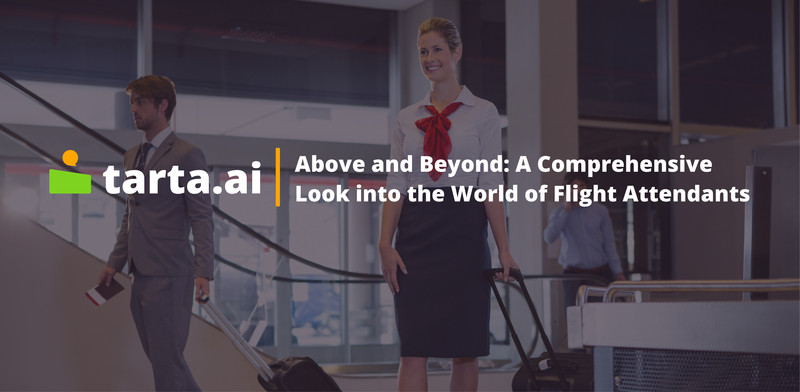
Interesting fact: The world's first flight attendant was a man named Heinrich Kubis. He served on a German Zeppelin in 1912.
Job Description
Flight attendants are essential members of a flight crew, responsible for ensuring the safety and comfort of passengers during their travels.
Requirements
| Requirements | Description |
|---|---|
| Language Requirements | Flight attendants are expected to be fluent in one or more languages in addition to their native language. This is especially important for international flights where passengers from different cultures may be traveling together. Common languages include English, Spanish, French, and Mandarin. |
| Age Requirements | Candidates must be at least 18 years old to become a flight attendant. Some airlines may have a maximum age limit for new hires, typically around 35 to 40 years old. |
| Physical Requirements | Flight attendants must be physically fit and meet certain requirements such as being able to lift heavy objects, stand for long periods of time, and have good vision and hearing. Airlines may also have specific height and weight requirements. |
| Training | All flight attendants must complete training programs approved by the Federal Aviation Administration (FAA). These programs typically last several weeks and cover topics such as safety procedures, emergency response, customer service, and cultural sensitivity. Once hired, flight attendants typically receive additional on-the-job training from their employer before starting their first flight. |
| Background Checks | All flight attendant candidates must undergo a background check, including a criminal history check and drug test. Airlines may also conduct credit checks and verify employment and education history. |
Cabin Crew Aptitude Test
The Cabin Crew Aptitude Test is a series of assessments designed to evaluate a candidate's potential to become a flight attendant. The test is typically used by airlines during the hiring process to determine whether a candidate has the necessary skills and attributes to work in this role.
The test may consist of several parts, including:
- Verbal Reasoning: This assesses the candidate's ability to understand and analyze written information.
- Numerical Reasoning: This evaluates the candidate's ability to work with numbers and perform basic mathematical calculations.
- Spatial Reasoning: This tests the candidate's ability to visualize and manipulate objects in three-dimensional space.
- Personality Assessment: This evaluates the candidate's personality traits, such as their level of extroversion, emotional stability, and conscientiousness.
- Situational Judgment: This assesses the candidate's ability to make decisions and solve problems in hypothetical scenarios that may arise during a flight.
Research has shown that the Cabin Crew Aptitude Test is an effective tool for predicting the success of flight attendants on the job. A study published in the Journal of Aviation Psychology found that candidates who scored higher on the test were more likely to perform well in their role as flight attendants.
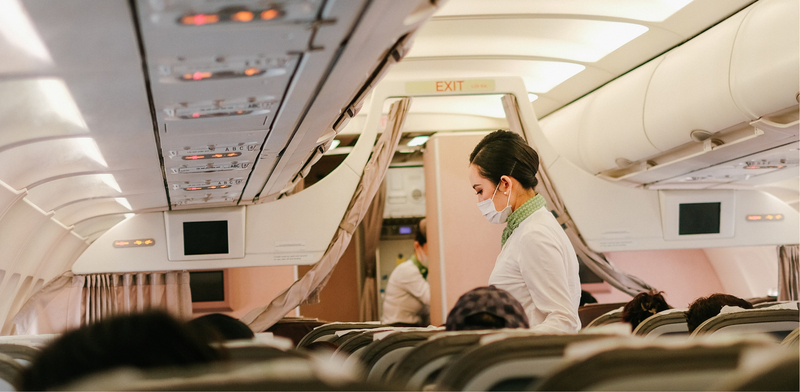
Photo: Pew Nguyen/Pexels
Interesting fact: The profession used to be exclusively female. It wasn't until the 1970s that airlines began hiring male flight attendants.
Main Responsibilities
The main responsibilities of flight attendants include ensuring the safety and security of passengers, providing excellent customer service, and assisting passengers with their needs during the flight. Some specific responsibilities include:
- Conducting pre-flight safety checks and demonstrations
- Assisting passengers with boarding and stowing their luggage
- Providing safety instructions and guidelines to passengers during the flight
- Monitoring the cabin for any potential safety hazards or issues
- Responding to emergencies and providing assistance to passengers as needed
- Serving food and beverages to passengers
- Managing the cabin environment, including temperature and lighting
- Providing information and assistance to passengers on their travel arrangements, such as connecting flights or ground transportation.
Additional Duties
- Flight attendants may also be responsible for additional duties, such as:
- Assisting passengers with special needs, such as unaccompanied minors or passengers with disabilities
- Administering first aid to passengers in need
- Dealing with unruly or disruptive passengers
- Assisting with customs and immigration procedures
- Performing administrative tasks, such as completing paperwork and reports
Skills
To be successful as a flight attendant, you need to have a combination of hard and soft skills. Hard skills are specific technical abilities that are necessary for the job, while soft skills are personal qualities that enable you to work well with others and handle different situations.
Hard Skills | Soft Skills |
Knowledge of safety procedures and emergency protocols | Strong communication skills, including the ability to speak clearly and calmly in a variety of situations |
Ability to operate safety equipment, such as oxygen masks and life rafts | Ability to work well under pressure and handle stressful situations |
Knowledge of food safety and hygiene regulations | Excellent customer service skills, including the ability to remain polite and professional in difficult situations |
Ability to operate in-flight equipment, such as entertainment systems and intercoms | Adaptability and flexibility, as flight schedules and routes can change at short notice |
Note: Flight attendants are trained to deal with emergency situations, including fires, medical emergencies, and evacuations. They undergo rigorous training programs to prepare for these scenarios.
Salary
The average salary for a flight attendant varies depending on factors such as the airline, experience, and geographic location. According to the US Bureau of Labor Statistics, the median annual salary for flight attendants in 2021 was $56,640.
According to PayScale, the average hourly rate for a flight attendant in the United States is $23.34, with an average total compensation of $50,000 per year.
Factors that Influence Earnings
- Airline: Flight attendants at major airlines such as Delta, United, and American can earn significantly more than those at smaller regional airlines.
- Experience: Experienced flight attendants typically earn more than those who are just starting out.
- Location: Flight attendants based in larger cities or on international flights may earn more than those based in smaller cities or on domestic flights.
- Seniority: As flight attendants gain more experience and seniority, they may be eligible for higher pay and better benefits.
- Union Representation: Many flight attendants are represented by a union, which can help negotiate better pay and benefits.
Ways to Improve Earnings
Flight attendants can take several steps to improve their earnings, including:
- Pursuing additional training: Specialized training in areas such as first aid or foreign languages can make a flight attendant more valuable to an airline.
- Seeking promotions: Many airlines offer opportunities for flight attendants to move into supervisory or managerial roles, which can come with higher pay and benefits.
- Seeking additional flight assignments: Flight attendants who are willing to work more flights or take on extra assignments may earn more money.
Additional Benefits
In addition to salary, flight attendants may receive a range of additional benefits, such as:
- Health insurance: Many airlines offer health insurance to their employees.
- Retirement benefits: Some airlines offer retirement plans, such as a 401(k), to their employees.
- Travel perks: Flight attendants may be eligible for free or discounted travel on their airline or other airlines.
- Flexible schedules: Flight attendants may have the opportunity to choose their own schedules or work part-time.
- Paid time off: Flight attendants typically receive paid time off for vacations and holidays.
Note: Flight attendants are not paid for the time they spend on the ground preparing for flights, such as attending briefings and going through security.
Job environment
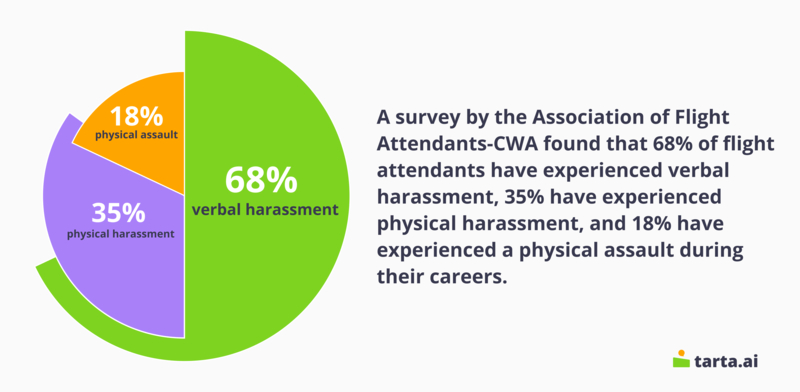
Description of Settings
Flight attendants work in a variety of settings depending on the type of flight they are working on. These settings can include commercial airlines, private charters, and corporate aircraft. Regardless of the setting, flight attendants must be able to work in confined spaces and handle the demands of working on an aircraft.
Description of Tools
The tools that flight attendants use on the job include safety equipment such as oxygen masks, life vests, and emergency exits, as well as passenger service items such as food and beverage carts, blankets, and pillows. Flight attendants must also be familiar with the aircraft's systems and be able to use communication tools such as intercoms and public address systems to relay important information to passengers.
Work Schedule
The work schedule for flight attendants can vary greatly depending on the airline or charter company they work for. Flight attendants may work irregular hours, including nights, weekends, and holidays. They may also be required to work long shifts or be away from home for extended periods of time. However, many airlines have strict regulations on the amount of time flight attendants can work in a day or a week, to ensure that they get adequate rest between flights.
Physical Demands
In addition to the tools they use, flight attendants must also be able to handle the physical demands of the job, which can include standing for long periods of time, lifting heavy objects, and maneuvering through tight spaces. They must also be able to remain calm and professional in emergency situations, and work well under pressure.
Note: Some airlines have strict grooming standards for flight attendants, including requirements for hair length and makeup.
Education Requirements and Career Path
Flight attendants are an essential part of the airline industry, responsible for ensuring the safety and comfort of passengers during flights. While a bachelor's degree is not usually required for this profession, certain education and certification requirements must be met to become a flight attendant.
Education
Flight attendants generally do not need a bachelor's degree or higher education to work in the field. However, some airlines may prefer or require a degree in hospitality, tourism, or a related field. This can be beneficial for career advancement opportunities.
Professional Associations
There are several professional associations for flight attendants, including the Association of Flight Attendants (AFA) and the International Association of Machinists and Aerospace Workers.
These organizations provide resources and support for flight attendants, including career development opportunities, networking events, and educational resources.
Licenses and Certifications
Flight attendants are required to obtain a certification from the Federal Aviation Administration (FAA) in order to work in the airline industry. This certification is known as the Certificate of Demonstrated Proficiency (CDP), and it is issued after completion of a training program approved by the FAA.
To obtain the CDP, flight attendants must complete the training program and pass a written and practical exam. The written exam covers topics such as safety procedures, emergency response, and aircraft systems. The practical exam involves demonstrating the skills learned during the training program, such as evacuating an aircraft, operating emergency equipment, and providing first aid to passengers.
Once flight attendants have obtained the CDP, they must also complete ongoing training to maintain their certification. This includes recurrent training every year, which covers updates to safety procedures, changes to aircraft systems, and any new regulations or policies.
The CDP is an important certification for flight attendants as it demonstrates that they have the necessary skills and knowledge to ensure passenger safety and comfort during flights. It is also required by airlines and regulatory agencies as a condition of employment in the airline industry.
In addition to the CDP, flight attendants may also need to obtain additional certifications for specific types of aircraft or for international flights. These certifications may involve additional training and testing, and they demonstrate that flight attendants have the skills and knowledge to work on specific types of aircraft or in specific regions of the world.
Training programs
Training programs for flight attendants are comprehensive and cover a wide range of topics to prepare them for their job. These training programs are mandatory and are required by the Federal Aviation Administration (FAA) to ensure that flight attendants are equipped with the necessary knowledge and skills to ensure passenger safety and comfort during flights.
The training program typically takes several weeks and is divided into both classroom and hands-on training. The classroom training covers topics such as aviation regulations, emergency procedures, aircraft systems, and passenger service. Hands-on training involves practicing emergency procedures such as evacuating an aircraft, operating emergency equipment such as fire extinguishers and oxygen masks, and providing first aid to passengers in need.
Some of the specific topics that are covered during flight attendant training include:
- Safety Procedures: This includes the use of emergency equipment such as oxygen masks and life rafts, procedures for evacuating the aircraft during an emergency, and the proper way to secure passengers and equipment.
- Emergency Response: This involves training on how to respond to different types of emergencies, including medical emergencies, security threats, and fires.
- Customer Service: Flight attendants are also trained in providing excellent customer service to passengers. This includes topics such as handling difficult passengers, dealing with language barriers, and ensuring passenger comfort.
- Cultural Sensitivity: Flight attendants are trained to be culturally sensitive and aware of different customs and practices. This is especially important for international flights where passengers from different cultures may be traveling together.
Note: The job of a flight attendant is physically demanding, as they are required to stand for long periods of time, lift heavy objects, and maneuver through tight spaces.
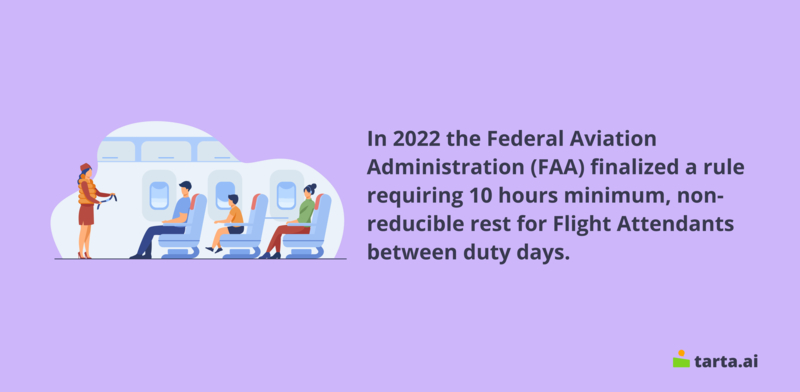
Career Path
Ways of Career Development
One way for flight attendants to advance in their careers is to take on additional responsibilities within their roles, such as becoming a lead or senior flight attendant. They can also pursue further training and education to move into management positions, such as becoming a base manager or director of inflight services. Additionally, flight attendants can work towards becoming a trainer or recruiter for new hires.
Subfields and Specialization
Flight attendants can specialize in a variety of subfields within the airline industry. For example, they may choose to work on international flights, where they will need to be knowledgeable about customs and immigration procedures in different countries. They may also work on regional flights, where they will need to be familiar with smaller aircraft and the unique challenges that come with serving passengers on short flights. Some flight attendants may also specialize in corporate aviation, where they will work on private jets or for companies with their own planes.
Flight attendants can specialize in various areas to enhance their skills and knowledge. For example, they can specialize in emergency medical training, which can be especially important on longer flights. They can also learn additional languages to better serve passengers from different countries. Additionally, some flight attendants may specialize in catering or hospitality to improve their customer service skills.
Alternative Careers and Similar Jobs
Flight attendants can pursue alternative careers within the airline industry, such as airline customer service agents or ground operations personnel. These positions may offer more stable schedules and may not require as much travel as a flight attendant role. Outside of the aviation industry, flight attendants can pursue careers in hospitality, such as working at a hotel or resort. They may also consider event planning or other customer service-focused roles. Some similar jobs to flight attendants include cruise ship attendants, train attendants, and tour guides, which all involve working with passengers and providing customer service.
Ways of Career Development | Subfields | Specialization | Alternative Careers and Similar Jobs |
Taking on additional responsibilities | Lead or senior flight attendant | International flights, aircraft models | Customer service, operations, hospitality, event planning |
Pursuing further education and training | Base manager, Director of inflight services | Safety and security, language proficiency | Airline management, airport operations, travel and tourism, hospitality management |
Becoming a trainer or recruiter | Training program development, Teaching new hires | Training evaluation and assessment, curriculum development | Corporate training, education, instructional design |
Note: Some airlines have strict grooming standards for flight attendants, including requirements for hair length and makeup.
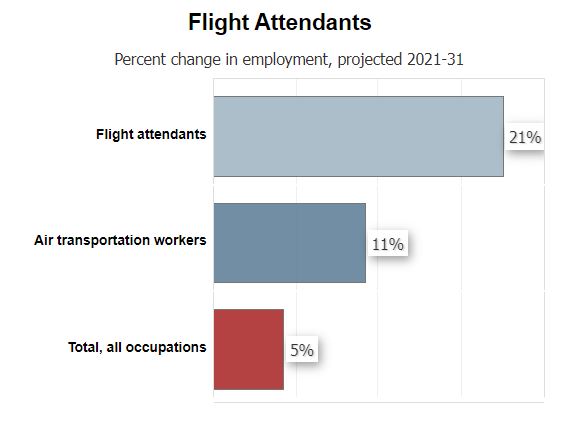
Source: U.S. Bureau of Labor Statistics, Employment Projections program
Job Outlook
According to the U.S. Bureau of Labor Statistics (BLS), the employment of flight attendants in the United States is projected to grow 21 percent from 2021 to 2031, which is faster than the average for all occupations. However, the BLS also notes that competition for jobs in the airline industry, including for flight attendants, is expected to be strong.
About 18,100 openings for flight attendants are projected each year, on average, over the decade. Many of those openings are expected to result from the need to replace workers who transfer to different occupations or exit the labor force, such as to retire.
Globally, the job market for flight attendants is influenced by factors such as economic conditions, changes in the airline industry, and fluctuations in travel demand. However, despite these factors, the need for trained and qualified flight attendants is expected to continue, as airlines seek to provide safe and comfortable travel experiences for their passengers.
Due to the impact of the COVID-19 pandemic on the airline industry, there have been significant changes in the demand for and employment of flight attendants in 2021 compared to previous years. Many airlines have reduced their flight schedules and staffing, resulting in furloughs, layoffs, and reduced hours for flight attendants. However, with the rollout of COVID-19 vaccines and the gradual reopening of international travel, there are hopes for a recovery in the airline industry and employment opportunities for flight attendants in the coming years.
Job satisfaction
Advantages | Disadvantages |
Travel opportunities | Irregular work schedule, including long hours |
Exposure to different cultures and languages | High stress levels and demanding work environment |
Opportunities for career advancement | Dealing with difficult passengers or emergency situations |
Competitive salary and benefits | Time away from home and family |
Meeting new people and making connections | Physical demands of the job, including standing for long periods and lifting heavy objects |
Working as part of a team and developing teamwork skills | Lack of job security in a volatile industry |
Opportunities to work for prestigious airlines or private charters | Impact on personal life, such as missing important events or holidays |
Government Program
There are several government programs that flight attendants may be eligible for, including:
- Federal student loan forgiveness programs: Flight attendants who have federal student loans may be eligible for loan forgiveness programs, such as the Public Service Loan Forgiveness program or the Teacher Loan Forgiveness program, if they meet certain requirements.
- Veterans Affairs benefits: Flight attendants who are veterans or dependents of veterans may be eligible for a range of benefits, including education and training benefits, health care, and disability compensation.
- Workers' compensation: Flight attendants who are injured on the job may be eligible for workers' compensation benefits, which provide medical care and wage replacement during the period of recovery.
- Unemployment insurance: Flight attendants who are laid off or have their hours reduced may be eligible for unemployment insurance, which provides temporary financial assistance while they search for new employment.
- Social Security: Flight attendants who have paid into the Social Security system may be eligible for retirement, disability, and survivor benefits.
- Flight attendants play a critical role in ensuring the comfort and safety of passengers during air travel.
- They are responsible for maintaining a calm and professional demeanor, even in challenging situations, and providing excellent service to passengers.
- Flight attendants are required to complete training and certification programs, hold a valid FAA certificate, and can join professional associations for support and advocacy.
- Flight attendant training programs are designed to ensure that flight attendants have the necessary skills and knowledge to provide safe and comfortable flights for passengers.
- Flight attendants can take steps to improve their earnings, such as pursuing additional training or seeking promotions.
- The employment of flight attendants in the US is projected to grow faster than the average for all occupations.
- Advantages of being a flight attendant include travel opportunities, opportunities for career advancement, and competitive salary and benefits.
- Flight attendants may be eligible for government programs such as federal student loan forgiveness, Veterans Affairs benefits, workers' compensation, unemployment insurance, and Social Security.
FAQ
What qualifications are required to become a flight attendant?
Candidates must also be at least 18 years old and have a valid passport. Airlines typically provide training to new hires.
What are the benefits of being a flight attendant?
Benefits may include health insurance, retirement plans, travel perks, and flexible scheduling.
Can flight attendants work for any airline?
Flight attendants can work for any airline that has openings and is hiring, but they may need to meet certain qualifications and requirements specific to that airline.
How long do flight attendants typically stay in the job?
The length of time that flight attendants stay in the job can vary, but it is not uncommon for them to stay in the position for many years or even their entire career.
What is the job of a flight attendant?
A flight attendant is responsible for ensuring the safety and comfort of passengers during flights. They assist with boarding and deplaning, provide safety instructions, serve food and beverages, and respond to passenger needs and emergencies.